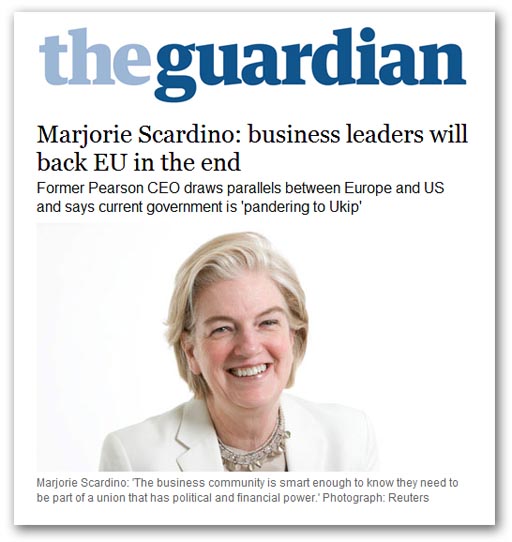The contrarian is Marjorie Scardino, the first woman chief executive of a FTSE 100 company. She was boss of the Financial Times and Penguin owner, Pearson, for 16 years, leaving in 2012, and yesterday delivered the annual Hugo Young lecture in London.
This was sufficiently prestigious for David Cameron in 2009 to deliver the lecture but it has now become so obscure that only the Guardian has mentioned it. Even then, the full speech does not seem to be available online.
Nevertheless, the Dame – for she is one - Marjorie Scardino is telling us that she believes the UK business community will ultimately back the European Union in any referendum on Britain's membership.
She thinks business leaders were "intelligent enough" to know where their best interests lay, which was in closer European integration – even though her faith in the British business community generally was "at a nadir".
"I think they will be for Europe in the end. I think the business community is smart enough to realise that just having a trade union is not enough", she said. "They are smart enough to know they need to be part of a union that has political and financial power".
That is the voice of the unreformed europhile, but it also represents a strain of opinion that is probably very prevalent in the amoral world of corporate business. It is one which owes no loyalty but to itself, and goes wherever advantage might lie.
Scardino's comments, though, were not part of her speech, but made during a question and answer session after delivering the lecture. In her speech, she said she thought Hugo Young, europhile extraordinaire, and author of a book about Thatcher, entitled One of Us, would "likely have scolded the government for pandering to UKIP".
It can't be irrelevant that Scardino was born and raised in Texas – especially as the Guardian thought to mention it. She has only lived in the UK for twenty years and, such is her grasp of European history that she believes the EU is in need of leaders of the stature of George Washington and Abraham Lincoln to help it through its current political and financial malaise.
Europe, of course, has experience of great leaders, and it was precisely because of that that the peculiar structure of the European Union was devised, demonstrating – as if it was necessary – that her grasp of the projet is slender indeed – usually a necessary precondition for being in favour of it.
Only someone imbued with the most profound ignorance could, as she did in her speech, draw comparisons between the EU and the development of the US as a political union over more than two centuries, declaring that "having a single, strong leader was one of the factors that had helped her native country survive numerous political crises that could have torn it apart, including the civil war".
Of course, having a constitution which limited the powers of the executive, might have had something to do with it, as well as the makings of a democracy, But, to Scardino, the problem is the "paucity of imagination among politicians and business leaders" responsible for making decisions about the EU's political and financial future.
"If you don't have anyone brave enough to say, 'We've got to have something to bind ourselves together,' you are never going to have [a sense of union like the US has]," she added, then asserting: "The politics of Europe is unimaginative and bureaucratic".
This is what passed for corporate wisdom these days, following which we are told that, another lesson from the history of the US was that building a union between disparate groups of people takes time, above all else.
Scardino tells us that the US grew from 13 British colonies that shared a common language and culture, whereas the EU was trying to forge closer union from countries that in some cases had been in existence for more than 1,000 years, with "very, very long histories and very well-dug-in legacies".
"It's not about legislatures being more compromising; it's not about anything other than time. It takes a long time to build democracy, to build freedom", she says.
But, since the EU is trying to build neither, this should not be her concern. She should be "intelligent enough" to understand that. Failing that, she should try to understand that political integration is not a choice that should belong to business, or one in which we need lessons from a corporate ex-CEO.
COMMENT THREAD
